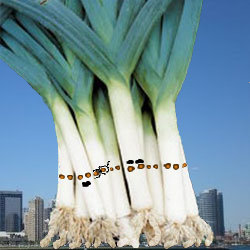Leek
A leek is a vegetable, like onions, carrots and tomatos (though the latter will eat anyone who tells them they are vegetables). Their main use is to be worn to honour Saint Dafad, but they are also eaten, mainly by the Welsh. These things are done in order to prove they are really Welsh and not English; the distinctive odour is particularly effective at making the difference clear, as everyone who is not Welsh will in short order be compelled to leave the room. This may also be desired in some cases.
Protests[edit | edit source]
On 1 March of every year, leeks from all over the world come together to organise peaceful demonstrations in protest of the practice of eating and wearing them. They claim that these things are unethical and constitute cruelty to plants, and that if animals are given special rights, plants should be as well. These claims are ignored by the Welsh government and people, as they refuse to believe that their belovedly smelly national plant would rise up against them and denounce them for the plant abusers they are. Apparently, however, leeks have no sense of loyalty and no gratitude for being honoured with the distinguished status of national plant, however noble their cause might be.
Reports that leek protesters attack people and damage property are frequent, but have so far been unsubstantiated. The leeks deny these vigorously, saying that they are nonviolent and the Welsh are in fact attacking them in the way they have chosen to celebrate St. David's Day. No reliable source has yet been found to support either point of view, and as such we cannot endorse a specific side of the debate.
It is also not known how the leeks came to have eyes and be able to walk. When questioned on this, they simply reply that it is speciesist, as no one would dare ask it of a human.
Other uses[edit | edit source]
Leek is also a small town in the Netherlands, known for having frequent flooding problems.
